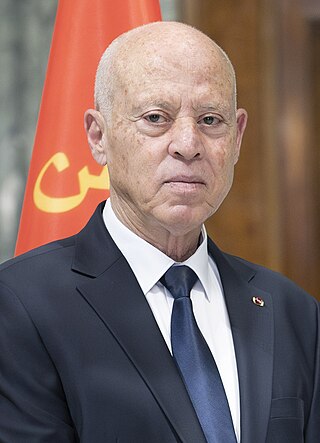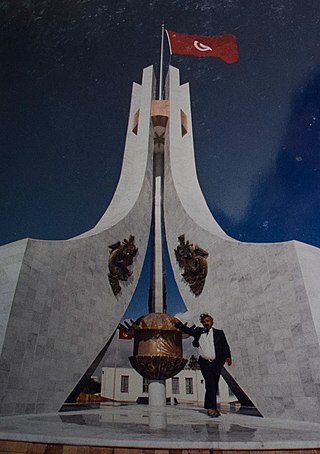Related Research Articles

Tunisian culture is a product of more than three thousand years of history and an important multi-ethnic influx. Ancient Tunisia was a major civilization crossing through history; different cultures, civilizations and multiple successive dynasties contributed to the culture of the country over centuries with varying degrees of influence. Among these cultures were the Carthaginian – their native civilization, Roman, Vandal, Jewish, Christian, Arab, Islamic, Turkish, and French, in addition to native Amazigh. This unique mixture of cultures made Tunisia, with its strategic geographical location in the Mediterranean, the core of several civilizations of Mare Nostrum.

Muhammad VII al-Munsif, commonly known as Moncef Bey was the Bey of Tunis between 19 June 1942 and 14 May 1943. He was the penultimate ruler of the Husainid dynasty.

Tunisian Arabic, or simply Tunisian, is a variety of Arabic spoken in Tunisia. It is known among its 12 million speakers as Tūnsi, "Tunisian" or Derja to distinguish it from Modern Standard Arabic, the official language of Tunisia. Tunisian Arabic is mostly similar to eastern Algerian Arabic and western Libyan Arabic.

The Tunisian Football Federation is the governing body of football in Tunisia. It established on 29 March 1957. It became a member in the FIFA in 1960, and in the same year it also became a member of CAF association. The federation also joined the UAFA in 1976 and the UNAF in 2005.

The Bourse des Valeurs Mobilières de Tunis (BVMT) or Bourse de Tunis is a stock exchange based in Tunis, Tunisia. It was founded in 1969, and currently lists around 50 stocks.
The Établissement de la Radiodiffusion-Télévision Tunisienne (ERTT) – French for Tunisian Radio and Television Establishment – was Tunisia's state broadcasting organization from 1990 until 2007 before it was split into the Tunisian Television Establishment and the Tunisian Radio Establishment. It operated two national television channels and several radio stations.

El Watania 1, also known as Télévision Tunisienne 1, is the first Tunisian public national television channel. It is owned and operated by Télévision Tunisienne. Formerly named RTT (1966–1983), RTT 1 (1983–1992), TV7 (1992–1997), Tunis 7 (1997–2008), Tunisie 7 (2008–2011), it has been known as El Watania 1 since 2011.

El Watania 2, also known as Télévision Tunisienne 2, is the second Tunisian public national television channel. It is owned and operated by Télévision Tunisienne. Formerly known as Canal 21 (1994–2007), then as Tunisie 21 (2007–2011), and as El Watania 2 since 2011. The television channel started broadcasting on November 7, 1994.
Jean Fontaine was a French writer, theologian, and missionary.

Beji Caid Essebsi served as the fifth president of Tunisia from 31 December 2014 until his death on 25 July 2019. Previously, he served as minister of foreign affairs from 1981 to 1986 and prime minister from February to December 2011.
The mass media in Tunisia is an economic sector. Under the authoritarian regimes of Habib Bourguiba, and then Zine el-Abidine Ben Ali, it saw periods of liberalization and then challenges, notably due to Tunisian censorship. The 2010-2011 Tunisian protests and the subsequent change in government may bring significant change in this domain.
Music in Tunisian Arabic has appeared in the 17th century. It has developed a lot since the 19th century and has spread all over Tunisia mainly after the creation of Radio Tunis and Établissement de la radiodiffusion-télévision tunisienne. Nowadays, Tunisian Arabic has become the main language of songs in Tunisia including Tunisian music, Underground music and Opera.

Kais Saied is a Tunisian politician, jurist and retired assistant professor of law currently serving as the seventh president of Tunisia since October 2019. He was president of the Tunisian Association of Constitutional Law from 1995 to 2019.

The National Monument of the Kasbah, more simply called the National Monument, is a memorial monument and a prominent symbol of several events in Tunisia. It is located in the center of the Kasbah Square in Tunis, facing the Town Hall.
The Tunisian Association for the Support of Minorities or ATSM is a Tunisian non-governmental organization fighting for minority rights, targeting antisemitism in particular.
Abdelwahab Bouhdiba was a Tunisian academic, sociologist, and Islamologist.
The Ministry of the Pen was a ministerial position in Tunisia between 1860 and the end of the monarchical regime in 1957.
Nassim Shamama or Nessim Scemama was a Tunisian businessman and philanthropist. As a Tunisian Jew, he held the role of caïd (head) for the Jewish community of the country. He also worked for the Husseinid beys, occupying the post of Receiver General and then Director of Finance. After amassing a huge fortune from his official positions he left Tunisia and after his death his estate became the subject of several famous and protracted international lawsuits.

The Établissement de la Radio Tunisienne is Tunisia's state-owned public radio broadcaster. It was formed in August 2007, when the former national state broadcaster ERTT was split into separate radio and television companies. Tunisian Radio operates ten stations, four nationwide and six regionally. It is an active member of the European Broadcasting Union (EBU) and the Arab States Broadcasting Union (ABSU).

The Établissement de la Télévision Tunisienne is Tunisia's national state-owned public service television broadcaster. The company was established by the country's president Zine El Abidine Ben Ali in August 2007, by dividing the country's former state broadcaster ERTT into separate companies for radio and television. Tunisian television operates two nationwide television channels and is an active member of the European Broadcasting Union (EBU) and the Arab States Broadcasting Union (ABSU).
